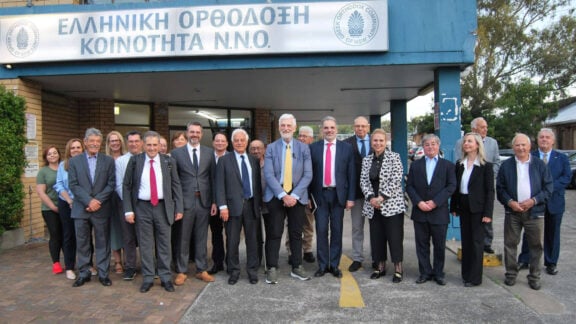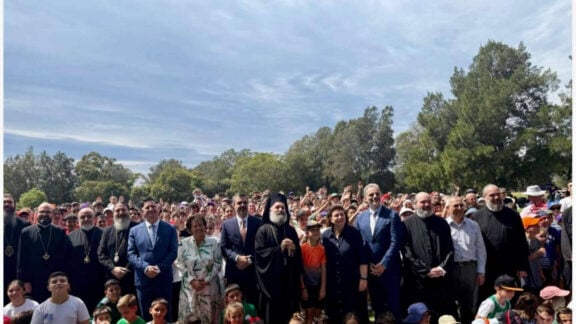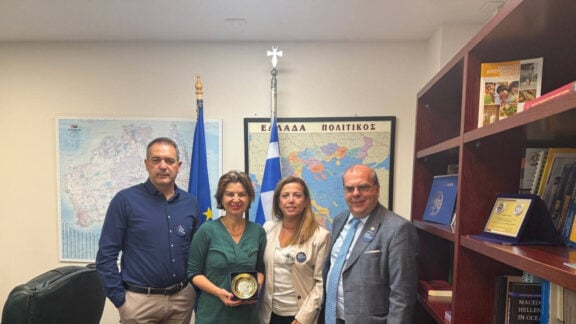Turkey has extended its navigation advisory (NAVTEX) for the Oruc Reis, to continue conducting its ‘seismic surveys’ for oil and natural gas in Greek waters south of Kastellorizo until 27 August.
The original NAVTEX for activities in the region was issued on 10 August and expired at Sunday midnight, however the new one extends exploration to Thursday. Other ships are advised to keep a distance of 11.1 kilometres from the zone where the Oruc Reis, Ataman and Cengiz Han vessels will be conducting activities. The three research vessels are accompanied by ships from the Turkish Navy, which are being closely monitored by Greek Navy vessels.
“By continuing its provocative behaviour, Turkey is only showing the world that the reference to international law and dialogue is purely superficial. With this behaviour, the only thing it succeeds is having negative consequences for their country,” Greek officials told the Athens Macedonian News Agency (AMNA).
In July, Turkey had sent the Oruc Reis to explore the same region, however German diplomatic efforts helped defuse tensions after Greek objections to the activities. The decision of Greece to sign a maritime delimitation agreement with Egypt, however, caused Turkey to return to its original plans with Ankara accusing Athens of undermining its maritime claims and violating Turkey’s sovereign rights.
READ MORE: German paper claims Angela Merkel staved off Greek-Turkish military clash
Turkey has also contested Cyprus exploration in the Eastern Mediterranean, claiming that the Turkish-invaded part of the island also has rights to the resources in the area.
Irish Sinn Fein party spokesperson on Foreign Affairs and Defence John Brady issued a warning. “The cause of this tension lies in the discovery of what is a major gas find in the region, which is estimated to be in the region of 3.5 trillion cubic metres. Or enough to keep the whole of the United States supplied for up to a decade. EU interest in the area lies in the potential of the gas find to ease European energy dependency on Russia,” he said.
“The potential for conflict in the area grows as Cyprus, Greece and Turkey issue competing claims on the coastal areas surrounding Cyprus, and the Greek Islands of Crete and Karpathos. The decision by the French government to send naval vessels and jet fighters into the area to provide backing to Greek and Cypriot forces, following Turkish incursions into areas where French oil companies are engaged in exploration, illustrates the volatility of the situation.”
The United Nations convention for the law of the sea recognises an exclusive economic zone (EEZ) which allows a nation to claim any mineral deposits discovered under the sea for a 200-mile radius. Turkey has not signed up to the UN convention. Energy ministers from Greece, Cyprus, Egypt, Palestine, Jordan and Israel met last year to discuss co-operation in the area and the setting up of the East-Med Gas Forum, however Turkey was not present.
READ MORE: EU more concerned with Belarus than protecting Greece from Turkish threats
Turkey and Libya have entered an agreement to reward themselves with large sections of the gas fields between them, with sections of these lying adjacent to Cyprus, Crete and Karpathos.
The prestigious German weekly news magazine, Der Spiegel, reports Turkish President Recep Tayyip Erdogan is out to redraw the borders in the Mediterranean and provoking neighbouring Greece now that both governments have mobilised their navies.
In June 2006, the magazine writes, the (then) head of the Turkish navy’s planning staff, Cem Gürdeniz, drew up a foreign policy concept that interested almost nobody at the time – it appeared too reckless, too aggressive.
In a speech in Ankara Gürdeniz demanded Turkey’s expansion in the Mediterranean region – if need be by force of arms. The government had to redraw the borders to safeguard Turkey’s economic and political interests, he said.
He called his plan “Mavi Vatan” (Blue Fatherland). In an interview by Skype he said: “I wanted Turkey to rise to a real sea power.”
That no one in Ankara wanted to know anything about his concept initially, Spiegel author Maximilian Popp wrote, was mainly due to Turkey then still trying to be accepted into the European Union.
Then prime minister Erdogan was not interested in a territorial clash with neighbour Greece.
Mr Gürdeniz’ own career ended abruptly when he was arrested in 2011 like hundreds of other military officers following the failed coup attempt against Erdogan.
Mr Gürdeniz describes himself as a Kemalist (a follower of Kemal Atatürk, the founding father of a secular Republic of Turkey). Ataturk negotiated the Treaty of Lausanne which helped to define the current borders. The treaty has been criticised by President Erdogan, however Mr Gürdeniz has said he felt more duty-bound to Atatürk’s secular inheritance than the Islamic-conservative government under President Erdogan.









